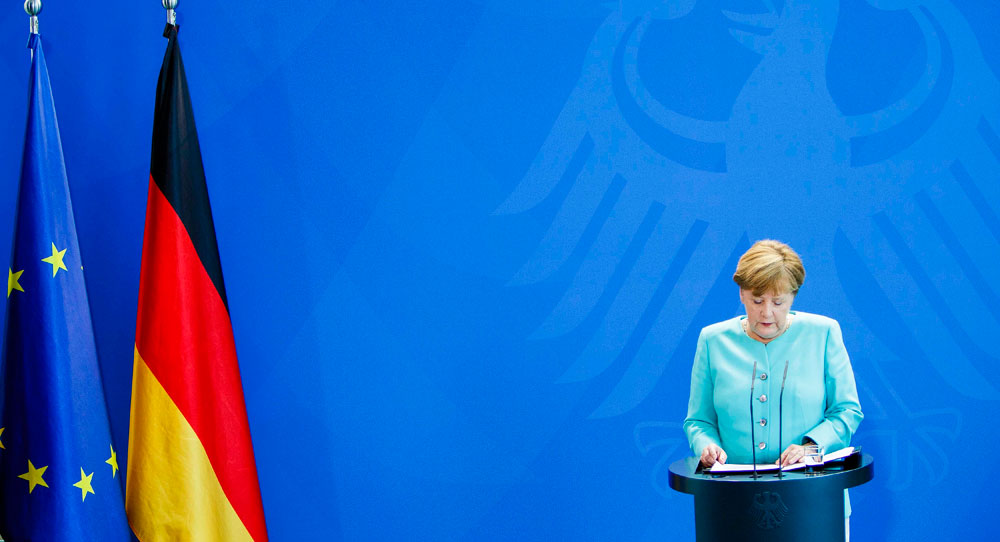Angela Merkel has nothing to lose.
As she prepares to lead the country for a fourth consecutive term, the German chancellor now has the chance to make a difference for Europe in a way that could be her legacy.
The coalition negotiations between Merkel’s conservative bloc and the Social Democrats will not be easy. The atmosphere is hardly euphoric. Martin Schulz, the leader of the Social Democrats, is unlikely to retain that position for long. His lackluster performance at the party’s extraordinary congress on January 21, but also the miserable reception he received from the delegates, clearly confirmed his weak position. It was not he but Andrea Nahles, who represents the younger generation in the party and is a born political strategist, who swung the delegates around to joining yet another “grand coalition” with Merkel’s Christian Democrats and the Bavarian-based Christian Social Union.
Then there is the eternal sniping by Horst Seehofer, leader of the Christian Social Union. Whether nagging at Merkel or bad-mouthing the Social Democrats, the party is no asset when it comes to creating an atmosphere conducive for difficult coalition talks.
And there is Merkel herself. Although politically weakened by the federal election results and aware of the growing discontent inside her own party about her style of leadership, Merkel faces a major choice. She can either use her fourth term to try to reassure Europe and Germany that stability and predictability is the order of the day. Or she can throw caution to the wind by embracing Europe in such a way that even populists and Euroskeptics would be disarmed by such energy and creativity. That would be a Herculean legacy.
Merkel, in ways, has already gone down in the history books as leaving legacies of sorts. Her decision to close all of Germany’s nuclear power plants after the Fukushima nuclear catastrophe in 2011 took even her own party by surprise, not to mention industry chiefs who had been pleasantly surprised that Merkel had earlier done a U-turn on abolishing nuclear energy soon after becoming chancellor but were now confounded by her new decision. While winning plaudits from an anti-nuclear public and environmental lobbies, it turned out that Merkel had put in place little or no strategy for ensuring that Germany could speed up the introduction of renewable energy.
The connections between the wind- and sea-endowed north and the mountainous south were practically nonexistent. The storage for excess wind energy was not in place. Germany clung onto the brown coal mines in the eastern part of the country, not only for jobs but because Germany needed energy. The big chemical industries, such as BASF, stood solidly behind the controversial Nord Stream, and now Nord Stream 2, pipeline that will transmit Russian gas to Germany via the Baltic Sea. “We need that gas because we lost nuclear power,” one executive of a leading energy company told Carnegie Europe. “The Energywende (the energy change) had no strategy,” he added. That legacy is flawed.
Then Merkel won plaudits for her compassionate decision to throw open Germany’s borders to almost 1 million refugees fleeing the wars in Syria and Iraq in 2015. Again, there was almost no consultation with her party, with the coalition, or with the European Commission. At least she let the government in Vienna know.
Yet there was no big strategic plan put in place to register the refugees, to verify their papers, to house them, or to establish not only an integration program but a way in which they could enter the labor market. Thanks to the overwhelming support of civil society, which showed up the crass incompetence of the Berlin authorities, things got done.
But Merkel’s ill-thought-out “Wir können das schaffen” (We Can Do It) shook sections of the German public. The Alternative for Germany (AfD) was catapulted into the Bundestag, or federal parliament, on September 24, 2017, because of its anti-immigrant, anti-Islam, and anti-Europe stance. Indeed, the refugee issue is going to be one of the sticking points during the coalition negotiations. The Social Democrats understand why family reunification is necessary for the many single male refugees while the Christian Social Union is vehemently against such a policy.
This leaves Merkel with a legacy in waiting. It is Europe. The time when Merkel could assume that Europe could soldier on under her leadership, but under a very weak leadership in France, is over. French President Emmanuel Macron has radically changed the dynamics, the pace, and the ambition of the European Union. He and Merkel have two years to push through a much more integrated Europe, not only of the eurozone but other aspects, too.
Between now and 2020, the EU will have a new commission and a new European Parliament. And without hedging any bets about whether Germany’s grand coalition will see through its four-year term, and assuming that there are no major political earthquakes for the conservative bloc and the Social Democrats, the new German government will have the next two years to make a difference for Europe.
It’s going to require a new, strategic mind-set by Merkel—one that will communicate why Europe has to change and why EU leaders should be able to challenge the cynics and the populists. Macron is already embarking on that. Now it’s Merkel’s turn to join him.








